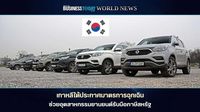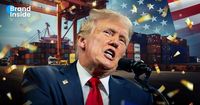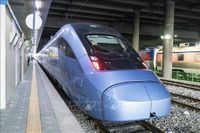South Korea is facing a turbulent economic landscape as the country grapples with the implications of new U.S. trade policies and a significant depreciation of its currency. The recent announcement from former President Donald Trump to tighten regulations on imported goods, particularly those under the de minimis rule, has sent ripples through South Korea's economy, which heavily relies on exports.
On April 2, 2025, Trump signed an executive order that effectively ends the de minimis rule, which previously allowed goods valued under $800 to enter the U.S. without incurring taxes. This change is expected to impact the flow of goods from countries like China and Hong Kong, which have taken advantage of this loophole. The Biden administration had already begun discussions to revise this rule, recognizing the need to protect American manufacturers from the flood of low-cost imports. According to reports, the import volume of Chinese products surged from 140 million to a staggering 1 trillion items annually over the past decade, a trend that the U.S. is now seeking to reverse.
The new regulations are set to take effect on May 2, 2025, and will impose a 25% tax on goods that were previously exempt under the de minimis rule. This move is expected to raise costs for Chinese e-commerce platforms like Temu, AliExpress, and Shein, which have been aggressively expanding into new markets, including South Korea.
In response to these changes, Temu has announced its intention to establish a significant presence in South Korea, partnering with local logistics firms to streamline operations. The platform has already signed a long-term lease for a logistics center in Gimpo, covering 165,000 square meters and equipped to handle temperature-controlled shipments. This strategic move comes as Temu aims to capture a larger share of the South Korean market, which has seen increased interest in Chinese e-commerce platforms.
Despite the potential for growth, South Korean officials are concerned about the implications of these foreign platforms on local businesses. The Korean government has pledged to support domestic manufacturers, especially in the automotive sector, which has been hit hard by Trump's tariff policies. Starting April 10, 2025, a 25% tariff on imported vehicles and parts is expected to further strain the industry. In anticipation of these challenges, the South Korean government plans to increase financial support for the automotive sector from 13 trillion won to 15 trillion won (approximately $10.18 billion) this year.
As the government works to bolster local industries, it is also preparing for a presidential election scheduled for June 3, 2025, following the impeachment of former President Yoon Suk-yeol. The election will follow a 60-day timeline mandated by law, and candidates must register by May 11. The interim president, Han Duck-soo, is expected to confirm the election date in a cabinet meeting on April 8.
Amidst these political changes, the South Korean won has plummeted to its lowest level against the U.S. dollar in 16 years, trading at 1,484.1 won per dollar as of April 9, 2025. This decline is attributed to concerns over the economic impact of Trump's tariffs and the ongoing trade war. The Bank of Korea (BOK) has indicated that it may intervene to stabilize the currency if volatility continues.
With the new tariffs and the depreciation of the won, South Korean consumers may face higher prices for imported goods, particularly from China. The government has expressed the need to negotiate with the U.S. to alleviate some of the pressures on its economy and is exploring new markets for its automotive exports, which accounted for 49% of total exports in 2024.
In a bid to enhance domestic competitiveness, South Korean manufacturers are also looking to improve the quality of their products. The government has announced plans to reduce taxes on car purchases from 5% to 3.5% until June 2025 and to increase subsidies for electric vehicles significantly.
As the political and economic landscape continues to evolve, South Korea faces the dual challenge of adapting to new trade realities while preparing for a pivotal election. The outcome of the election could have significant implications for the country’s economic strategy and its relationship with the United States.
In summary, the convergence of Trump's trade policies, the devaluation of the won, and the upcoming presidential election creates a complex environment for South Korea. The government’s response will be crucial in navigating these turbulent waters and ensuring the stability and growth of its economy in the face of external pressures.








